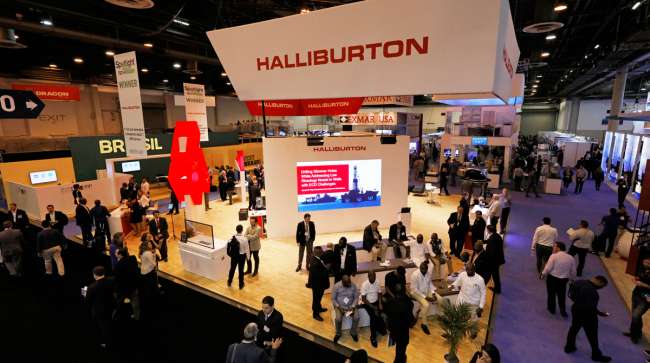“A lot’s happened in three weeks,” Miller said. (Aaron M. Sprecher/Bloomberg News)
Halliburton Co., the world’s largest provider of hydraulic fracturing services, fell sharply after warning investors that tariffs will impact a wide swath of the company’s business units.
The dominant North American oil field services provider told investors April 22 on a conference call that tariffs will have an impact of 2 to 3 cents per share during the second quarter, with 60% of the hit affecting its completions-and-production unit, which houses the fracking business. The rest of the tariffs impact will be to its drilling and evaluation segment.
The shares, which have lost about a quarter of their value this year, fell 5.8% at 11:54 a.m. in New York. While customers are still digesting the latest tariff news and evaluating their drilling plans, they’re better prepared to weather an industry downturn than they were in the past, CEO Jeff Miller said on the call.
Halliburton ranks No. 7 on the Transport Topics Top 100 list of the largest private carriers in North America.
“A lot’s happened in three weeks,” Miller said. “It will get digested, but the types of operators in North America are biased to working through things, I think, largely today as opposed to what we’ve seen in the past.”
Oil field servicers often provide the first indication of an industry downturn because they’re the ones hired to drill and frack new wells. After the trade war and OPEC’s recent decision to hike production hurt crude prices, investors largely expect U.S. shale producers to avoid pumping more barrels into an oversupplied market.
Halliburton is the first major company in the U.S. oil industry to disclose a specific financial impact from the global trade war. Larger oil field service rivals Baker Hughes Co. and SLB are scheduled to report first-quarter earnings this week.
Halliburton posted first-quarter revenue of $5.4 billion, the lowest since 2022, according to a statement April 22. Adjusted first-quarter profit fell to 60 cents a share, meeting analysts’ estimates. The shares fell as much as 9.9%.
With its significant exposure to the U.S. shale market, Halliburton offers the closest proxy to domestic oil-producer activity. Shale fracker Liberty Energy Inc. expects U.S. crude output to hold firm in 2025 as long as prices remain near current levels, CEO Ron Gusek said during a call with analysts last week.
Tariffs are having an impact on various Halliburton service lines such as its artificial lift business — which helps older wells continue to pump more crude — as well as on various drilling supplies, Halliburton Chief Financial Officer Eric Carre said.
“We are doing a lot of work on mitigating the impact of tariffs,” Carre said on the call. “We need a bit more clarity and stability in the structure of tariffs so that we can really understand what levers we can pull and then what the overall outcome is going to be.”






